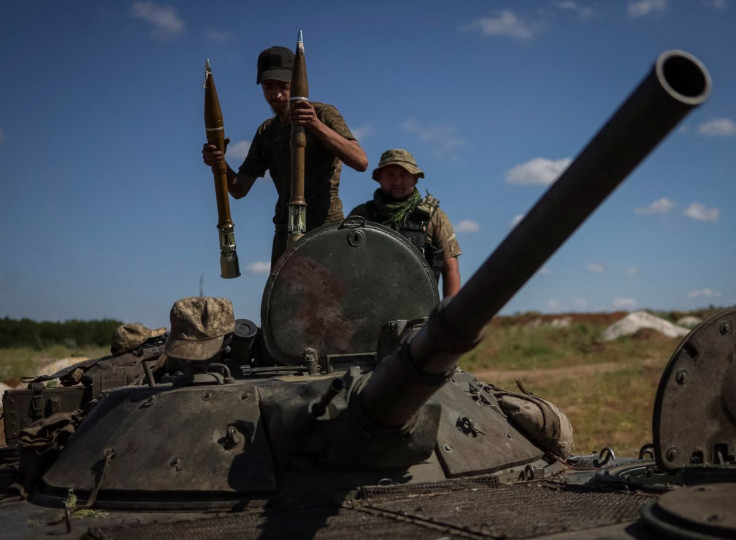Ukraine President Suspends Two Top Allies, Citing Russian Spy Infiltration

Nearly five months after Moscow's invasion, Ukrainian President Volodymyr Zelenskiy suspended the country's security chief and top prosecutor, saying they failed to purge Russian spies from their organizations.
One of those sidelined in the biggest government overhaul of the war, SBU security service chief Ivan Bakanov, was a childhood friend of Zelenskiy.
Bakanov and Prosecutor General Iryna Venediktova embodied Zelenskiy's policy of putting young political allies in charge of fighting corruption following the former TV comic's 2019 election.
But in a video statement, the president acknowledged that the pair had failed to eradicate traitors and collaborators from their organisations.
The deputy head of Zelenskiy's administration said on Monday the pair was suspended pending further investigation.
More than 60 officials from Bakanov's SBU security agency and the prosecutor's office were working against Ukraine in Russian-occupied territory, and 651 treason and collaboration cases had been opened against law enforcement officials, Zelenskiy said in his video address.
"Such an array of crimes against the foundations of thenational security of the state ... poses very serious questionsto the relevant leaders," Zelenskiy said.
Zelenskiy on Monday appointed Vasyl Maliuk, first deputy head of the SBU since March 2020, as acting chief.
Despite his disclosure of Russian penetration of the SBU, U.S. officials on Monday said Washington would continue sharing intelligence that U.S. officials have said Kyiv uses to respond to Moscow's attacks.
Zelenskiy, hailed on the world stage as a decisive war-time leader, was dogged before the invasion by accusations that he had named friends and other outsiders to jobs for which they were unqualified.
Bakanov, a friend since their childhood in southern Ukraine, helped run Zelenskiy's media business during his television career. He then led the campaign that saw Zelenskiy shift from playing the president on a sitcom to being elected in a landslide in real life.
Venediktova, a jurist, had advised Zelenskiy on judicial reform since he entered politics.
3,000 CRUISE MISSILES
After failing to capture Kyiv at the outset of the invasion, Russia shifted to a campaign of devastating bombardments to cement and extend its control of the south and east.
The Russians recently intensified long-distance strikes on targets far from the front, killing large numbers of civilians in what Ukraine calls terrorism. Moscow says it is hitting military targets. Zelenskiy said Russia had fired more than 3,000 cruise missiles so far.
Russian forces targeted Mykolaiv with cluster shells early Tuesday, injuring at least two people and damaging windows and roofs of private houses, the city's mayor, Oleksandr Senkevich, said in a social media post.
Kyiv hopes the war is at a turning point, with Moscow having exhausted its offensive capabilities in seizing a few small cities in the east, while Ukraine now fields long-range Western weapons that can strike behind Russian lines.
Kyiv cites a string of successful strikes on 30 Russian logistics and ammunition hubs, which it says are crippling Russia's artillery-dominated forces that need to transport thousands of shells to the front each day.
In a Facebook post on Monday, Ukraine's top military commander, General Valery Zaluzhny, credited U.S.-supplied advanced long-range rocket systems known as HIMARS with helping to "stabilize the situation" through "major strikes at enemy command points, ammunition and fuel storage warehouses."
Russia said on Monday that Defence Minister Sergei Shoigu had ordered the military to concentrate on destroying Ukraine's Western-supplied rockets and artillery.
European Union foreign ministers on Monday agreed to provide Ukraine with another 500 million euros ($504 million) in EU funds for arms, raising the bloc's support to 2.5 billion euros since Moscow invaded on Feb. 24.
In the south, Ukraine is preparing a counterattack to recapture the biggest swath of territory taken since the invasion. Ukraine reported destroying Russian missile systems, communications, radar, ammunition depots and armoured vehicles in strikes in the southern Kherson region.
In the east, Ukrainian forces withdrew at the start of July from Luhansk, one of two provinces Russia claims on behalf of its separatist proxies.
Kyiv says Moscow is planning another assault to capture the last Ukrainian-held pocket of neighbouring Donetsk province.
Russian President Vladimir Putin launched on Feb. 24 what he called a "special military operation" to demilitarise Ukraine and root out nationalists. Kyiv and the West call it an attempt to reconquer a country that broke free of Moscow's rule in 1991.
This week could be pivotal for European countries concerned about the impact of war and sanctions on gas supplies.
Russia is due to reopen its main natural gas pipeline to Germany, Nord Stream 1, in coming days after regular maintenance, but Europeans are worried Moscow could keep it closed.
© Copyright Thomson Reuters 2024. All rights reserved.











